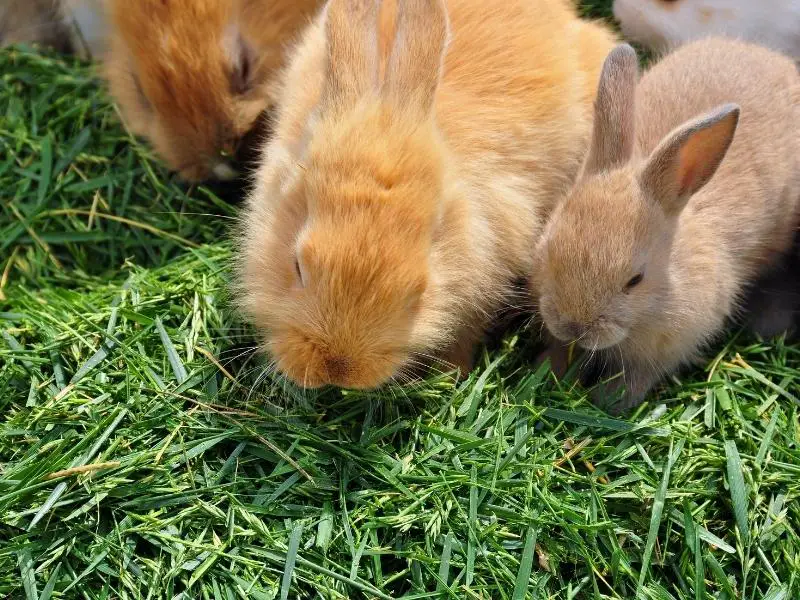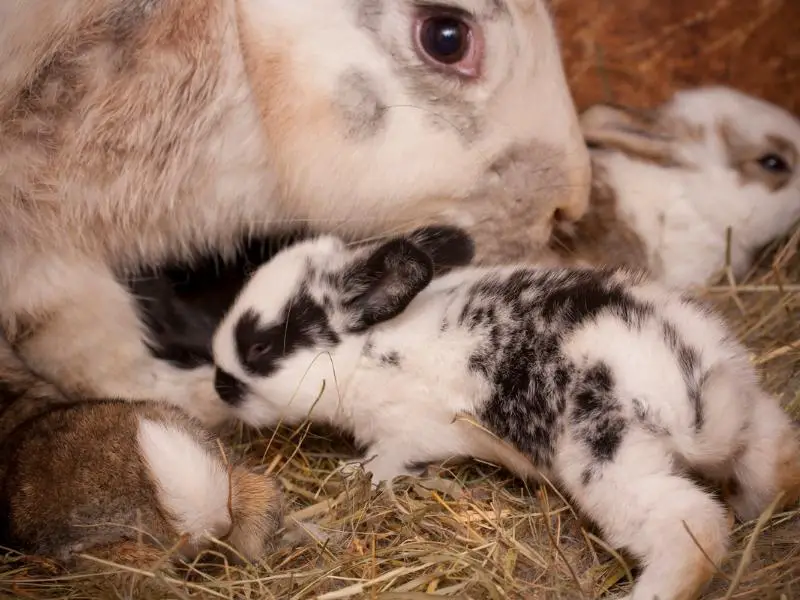Is your usually happy and playful female bun suddenly moody and cranky? Is she unfriendly toward you and your buck (male rabbit)? If your bun’s attitude suddenly changes, and she seems to be eating a lot more, she may be pregnant.
If this is the case, your next question may be: how long do rabbits stay pregnant?
A doe (female rabbit) experiences a short pregnancy, with a gestation period of only 28-34 days. The gestation period of each doe depends on factors such as her age, breed, size, and the number of kits (baby rabbits) she is carrying. Pregnancies that go over 34 days can indicate a false pregnancy.
If you have a pregnant doe or need more information on the gestation period of rabbits, then this guide will provide you with all the information you need.
At What Age Can a Rabbit Mate?
The average female rabbit reaches sexual maturity between the age of 4 to 9 months old, whereas the buck reaches sexual maturity sooner at around 2 to 3 months old. Domesticated rabbits can mate (breed) from 6 to 7 months.
Let’s take a closer look at what age domesticated rabbits are sexually mature:
- The small breed does (such as the Netherland Dwarf) mature at around 4 months old. The buck matures at around 5 to 6 months old
- Medium to large breed does (such as the Mini Lop) mature between 4 to 5 months old. The buck matures around 7 to 9 months old
- Giant rabbit breed does (such as the Flemish Giant) mature between 6 to 9 months old. The buck matures around 9 months old
When your bun has reached sexual maturity, she goes into heat. Here are a few signs that your bun is in heat. The doe:
- Becomes territorial over her living space
- Becomes more affectionate
- Has a swollen vulva
- Starts marking her territory by urinating constantly
- Begins mounting objects or other rabbits for stimulation
- May appear restless
At What Age Can a Rabbit Get Pregnant?
Female rabbits can get pregnant after their first heat cycle, which is between the age of 4 to 9 months. Once they have kindled (given birth) their first litter, they can fall pregnant again within 24 hours.
Factors such as breed, weight, and size also play a role when it comes to doe’s falling pregnant. Smaller breeds of rabbits typically mature sooner than larger breeds of rabbits.
Here’s a look at what age your bun can get pregnant:
Small Breed Doe
Small breed rabbits get pregnant from the age of 4 to 5 months. These rabbits include the:
- Holland Lop
- Polish Dwarf Hotot
- Netherland Dwarf
Medium Breed Doe
A medium-breed rabbit can get pregnant from the age of 5 to 6 months. Examples of medium rabbit breeds are the:
- Havana
- Mini Lop
- Florida White
- Dutch
Large Breed Doe
A large breed rabbit can get pregnant from the age of 6 to 8 months. Large rabbit breeds include the:
- Champagne d’Argent
- New Zealand
- Palomino
Giant Breed Doe
A giant breed rabbit can get pregnant from the age of 8 to 9 months. These rabbits include the:
- French Lop
- Flemish Giant
- Checkered Giant
How Long Does a Rabbit Normally Stay Pregnant?

Typically, a rabbit stays pregnant for a maximum of 34 days. If your bun still hasn’t kindled her litter after 34 days, you must contact your vet so the doe can be induced or undergo a C-section.
Let’s take a closer look at what you can expect over the 4 to 5 weeks of pregnancy:
- Week 1: Very little happens within the first 10 days of pregnancy. You may notice your bun starts eating more.
- Week 2: If you gently rub your buns’ tummy, you should be able to feel small round nodules, which are the fetuses.
- Week 3: The kits are developing in your buns womb, so it’s best to avoid rubbing her tummy or picking her up at this point.
- Week 4 and 5: Your bun will be getting ready for the kindling process and will start nesting.
Signs That Your Rabbit Is Pregnant
A sure sign of rabbit pregnancy is if your bun has been with an intact male and they are both over the age of 3½ months. Chances are high that she is pregnant.
Luckily, there are some very obvious signs you can look out for if you suspect that your bunny is pregnant. These signs include:
Mood Changes
One of the first and most obvious signs that your floppy-eared friend is pregnant is that their mood changes drastically.
Your calm, sweet bun may suddenly become aggressive and even go as far as to nip you when they feel particularly moody.
Not to worry; their mood swings are not only directed at you. Your bun may take her mood out on your male rabbit as well.
Increased hormones from the pregnancy play a big role in the mood of your rabbit
Nodules in the Stomach
One of the best ways to check if your rabbit is pregnant is by gently running your fingers across her tummy. If she is pregnant, you will feel some noticeable, small-shaped nodules inside her tummy.
The tiny nodules are the growing baby bunnies inside the womb. Your bun’s tummy and the nodules will continue to grow until the kits are kindled at around 31 days.
Nesting and Fur Pulling
Your bunny will start digging and gathering hay to prepare for the new litter. You will notice her carrying pieces of hay and soft grass in her mouth to a particular spot in her living area. This is known as nesting.
Another way that she will prepare the nest is by pulling out her fur to make a “blanket” for her kits. So if you see your bun pulling out tufts of her fur, be assured that this is completely normal behavior for pregnant rabbits.
How to Care for Your Rabbit During Pregnancy
You obviously want your doe’s pregnancy to go as smoothly as possible, so here are some simple ways that you can care for your rabbit during her pregnancy:
Provide a Suitable Birthing Place
Your bun can kindle up to 14 kits at a time, and she will need a safe and suitable place to do this.
A pregnant rabbit will need a living space big enough for her to move around for exercise. Her living space should also be reasonably quiet, with no bright lights that can cause distraction.
Set up a Nest Box
Provide your floppy-eared friend with a nest box. This can be made by simply using a cardboard box or crate.
Make the box comfortable by adding a layer of hay to the bottom. You can also provide your bun with various nesting materials such as shredded newspaper and old rags.
Keep the Hutch Clean
Make sure to clean your rabbit’s living environment and nesting box regularly to keep the space hygienic, as she may poop in the nesting box regularly.
It’s essential to stay away from store-bought disinfectants.
Instead, use a safe option, such as mixing 1 part white vinegar with 1 part warm water in a spray bottle. Spray the solution directly into the hutch to disinfect it.
Avoid Stressful Situations
Rabbits are generally very skittish and easily stressed. Your bun’s stress levels will be higher than usual when she is pregnant.
Severe stress can lead to your bun losing her entire litter. So, it’s important to avoid loud, sudden noises and keep other pets away from her living area.
Provide a Balanced Diet
Ensure your bun has a balanced and nutritious diet of fresh leafy greens, hay, and good-quality pellets.
You can also add alfalfa hay to her diet for extra protein and nutrients. It’s also essential to ensure that she always has access to fresh water.
Separate Them
One of the first things you should do once you have confirmed that your bun is pregnant is to separate the male from the female.
This is to prevent them from mating again, which can cause the female to fall pregnant with a second litter at the same time (known as a double pregnancy).
Females can also fall pregnant again 24 hours after kindling their litter. Rabbits get depressed when they are separated from one another, so it’s best to place a barrier, such as chicken wire, so they can still see one another.
My Last Bunny Thoughts
Rabbits are amazing little animals, and unlike most mammals, they are induced ovulators, meaning they can ovulate due to external stimuli. For this reason, they can fall pregnant within 24 hours of kindling (giving birth to) a litter.
A female rabbit can also experience a double pregnancy if the male mates with her while she is still pregnant. While a litter or two can be fun, it can become a burden on you and your rabbits, and takes a toll on your doe’s body.
Consider having your bunny spayed to avoid an unwanted litter.
Spaying the doe will make her less likely to develop uterine, ovarian, or mammary tumors. This means she will live longer and be a lot calmer around you and other bunnies.

